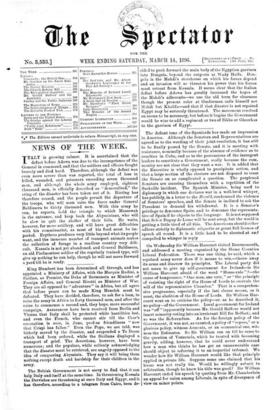On Wednesday Sir William Harcourt visited Bournemouth, and addressed a
meeting organised by the Home Counties Liberal Federation. There was one thing, he said, which a repulsed army never does if it means to win,—throw away its arms and disavow its principles. The Liberal party did not mean to give up self-government for Ireland—is Sir William Harcourt afraid of the word " Home-rule " P—the cause of temperance, "One man, one vote," or 'the principle of resisting the right of the House of Lords to overrule the will of the representative Chamber." That is a comprehen- sive programme, especially if the last clause means, as it must, the abolition of the House of Lords. Sir William Har- court went on to criticise the policy—or, as he described it, no-policy—of the Government. Local government for Ireland was "off " (apparently because Mr. Gerald Balfour would not insert minority-voting into an irrelevant Bill for Belfast), and so was the Referendum. As for the foreign policy of the Government, it was not, as vaunted, a policy of "repose," or a glorious policy, witness Armenia, or an economical one, wit- ness the Estimates. So Sir William ran on till he came to the question of Venezuela, which he treated with becoming gravity, adding, however, that he could never understand bow a man who thinks he has got an unanswerable case should object to referring it to an impartial tribunal. We wonder how Sir William Hareourt would like that principle applied in private life. Suppose some one claimed that his house was not really his. Would he willingly submit to arbitration, though he knew his title was good? Sir William Harcourt ended his speech by quoting from Mr. Chamberlain an appeal for union among Liberals, in spite of divergence of view on minor points.






































